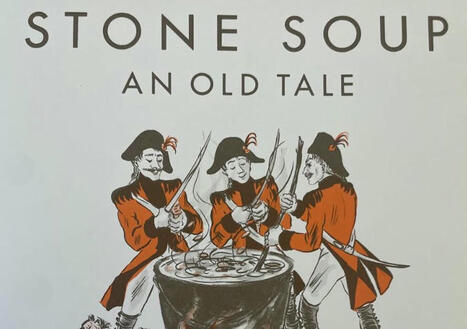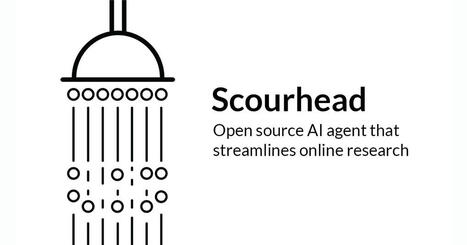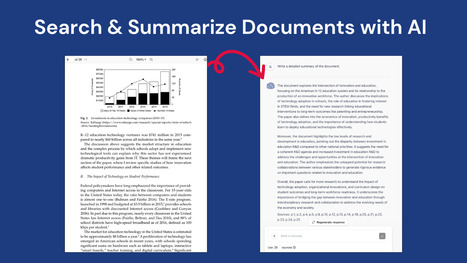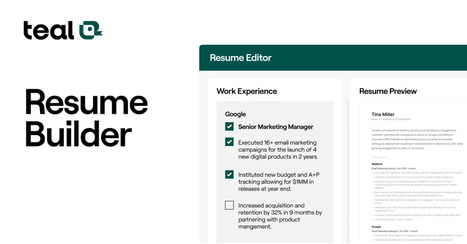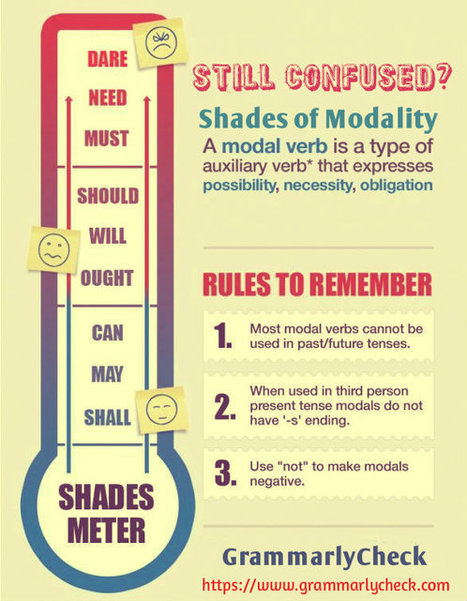
|
Rescooped by
Dennis Swender
from Digital Delights
August 9, 1:00 PM
|
Get Started for FREE
Sign up with Facebook Sign up with X
I don't have a Facebook or a X account

 Your new post is loading... Your new post is loading...
 Your new post is loading... Your new post is loading...
No comment yet.
Sign up to comment

EDTECH@UTRGV's curator insight,
March 12, 1:57 PM
AI systems are evolving from narrow task-specific agents to more autonomous digital workers, with Reasoners providing intelligence and agentic systems enabling action, potentially transforming expert-driven industries.
Institutions have no choice but to innovate to meet contemporary education needs and ultimately serve the public good. Via EDTECH@UTRGV 
EDTECH@UTRGV's curator insight,
January 30, 4:20 PM
"Institutions seeking to pursue program innovation, particularly when those innovations involve substantive changes in delivery or pedagogy, should consider what presently anchors the institution and what is needed for it to continue to thrive and preserve its essential mission."
From
scourhead
Scourhead is a free, open-source AI agent that scours the web, organizes data, and delivers results in a spreadsheet. Runs locally on your computer with no cloud dependencies or fees. Available for macOS, Windows, and Linux. Via Nik Peachey 
Nik Peachey's curator insight,
January 7, 9:57 AM
This is a fascinating free AI research agent. It searches the web, finds and organises your research based on the parameters you define https://scourhead.com/ You'll need to download it and run it from your laptop, but it doesn't look too complex to do. Video explainer here: https://youtu.be/fwtTrSmRK34?si=zCzGRjoh6sETucEm
Does this sound familiar to you at all? I used to log in to each and every individual social platform to compose new posts, check what’s happening in my streams, follow up on conversations and follower requests, and attempt to manually perform all other bits of social media management that was on my plate.Then, I switched to using tools, and my productivity has soared. Maximizing your time as a social media manager or business owner is crucial for social media growth and effectiveness. I’d love to share my 6 favorite tools for helping you along in that journey.... Via Jeff Domansky
Upload a document to get answers, summaries, translations, and citations in seconds.
Via Yashy Tohsaku
"A new effort uses AI chatbots to conduct interviews with human subjects, which proponents say will revolutionize measuring public opinion in a variety of ways" Via EDTECH@UTRGV 
EDTECH@UTRGV's curator insight,
November 22, 2024 1:13 PM
"[A] research team decided to reach out to hundreds of citizens to interview them about their views on key issues. But the interviewer asking the questions wasn’t a human researcher — it was an AI chatbot."
"Artificial intelligence (AI) has been subtly influencing various aspects of our world for decades. From personalized recommendations on platforms like Netflix to the auto-sensing capabilities in modern vehicles; AI’s presence is deeply embedded in everyday life [1, 2]. The public introduction of ChatGPT in November 2022 marked a significant turning point, making the power of AI accessible to a broader audience. This sparked both excitement and a wave of ethical concerns regarding its potential applications." Via EDTECH@UTRGV 
EDTECH@UTRGV's curator insight,
November 13, 2024 12:37 PM
"This editorial explores best practices and guidelines for the responsible use of AI in academic writing."
Artificial intelligence could help speedily summarize research. But it comes with risks. Via EDTECH@UTRGV 
EDTECH@UTRGV's curator insight,
November 15, 2024 12:24 PM
"Some of the newer AI-powered science search engines can already help people to produce narrative literature reviews — a written tour of studies — by finding, sorting and summarizing publications. But they can’t yet produce a high-quality review by themselves."
From
x
The search for the origin of the phrase ‘publish or perish’ has been intriguing since it was first raised by Eugene Garfield in 1996. Drawing on recent discoveries in relation to this q…
Via LGA
Looking for ways 🔍 to use the Web effectively for research? 🤔 Want to know how to get the most out of Google? Read this article & learn how to use Google to your advantage!
What’s the first thing we do when facing the unknown? We Google it, of course! Google is fundamental to our experience of the Internet. According to the statistics, more than 100 000 people press “search” on Google every second! At first glance, the process is straightforward. You type in what you need information about, press enter, and reap your reward. But, if your search is more complex, simply looking through the first page of results may not be enough. What are your other options? If you struggle to answer this question, we are here to help! This article by our custom-writing team offers you the most actionable and advanced Google search tips. Contents Using Search Engines for Research Basics of Quality Google Search Advanced Search Tips Top 12 Search Engines for Students Website Evaluation Tips References Simply put, a search engine is a program that helps you find information on the Internet. Nowadays, using them is an integral part of any research. Everyone knows their benefits: They allow us to access necessary information almost instantly. They’re highly convenient to use: just type in the keywords and press “Enter.” They provide unimaginable amounts of data, even on obscure topics. They customize the search results based on your location and search history. However, there are also a handful of downsides to using search engines: The information you are given is usually pretty limited. You can look through 15 links with identical content. The amount of data can be overwhelming. It’s easy to get lost in the endless stream of search results. The shallowness of the information you’re getting can also be an issue. All this makes quality Internet search pretty tricky. But don’t worry: we will tell you about the techniques you can use to overcome these difficulties. The Basics of a Quality Google SearchFirst off, let’s look at a few simple ways to get the most out of Google. These are essential techniques anyone can use: Refine the wording of your search terms. Try to keep the words as close to the topic as possible. If you are looking for a rock music article, you better not search “heavy music piece” on Google. “Heavy music” doesn’t necessarily mean “rock,” and “piece” doesn’t always refer to an “article.” Set a time frame. It’s a good idea to set parameters around when the material was published. To do this, go to Google search, press “Tools,” then “Any time,” set “Custom Date Range,” and select the dates relevant for you. Keep your search terms simple. There’s no need to overcomplicate things. After all, Google is smart. If you are looking for statistics on education in the US, simply typing in “US education facts” can work wonders. Use the tabs. You can make your search results far more refined by simply choosing a corresponding tab. It’s helpful when looking specifically for images, books, or news. Perform an advanced search. If your results are too vague and generalized, this option is your solution. Simply go to advanced search. Here, you can customize your key terms in great detail, from result language to file format. 7 Advanced Actionable Tips for Using Google Search If you already knew about the basics listed above, here are more advanced tips, including wildcards. What are wildcards in a Google search? Well, they serve as placeholders for characters or words. They are extremely helpful for refining and maximizing search results. Try them out! Use Quotation Marks to Search for Exact TermsPutting simple quotation marks around your search terms can help you with many things, such as: Searching complicated terms. If you need to search for an exact phrase that consists of 2 or more words, make sure to put it in quotations. This way, you’ll avoid results containing only one of the words. For example, typing in “Atomic mass unit” with and without quotation marks can produce different results. Finding the source of a quote. Sometimes you find a witty quote but don’t know who said it. In this case, just type the quote in the Google search bar using quotation marks, and the source should be the first result. For instance, searching for “If you tell the truth, you don’t have to remember anything” will show you that Mark Twain said it. Fact-checking a quote. Some phrases are so popular that people attribute them to a handful of different authors. If you’re unsure if Abraham Lincoln ever said anything about the harm the Internet does, you can check that by simply googling the whole quote. Spoiler: no, he didn’t say that. Add an Asterisk for Proximity Searches An asterisk (* symbol) can be a handy tool when searching the Internet. What it does is act as a placeholder for any word. When Google sees asterisks among your search terms, it automatically changes the symbol to any fitting word. Say you want to find a quote but don’t know the exact wording. You would type in “You do not find the happy life. You * it.” The asterisk will be magically substituted with “make,” and the author will be listed as Camilla Eyring Kimball. Type AND, OR, AND/OR to Expand the ResultsTyping OR (in all caps) between 2 search terms will make Google look for results for any of the words. It won’t send you to a link with both terms listed. In contrast, AND command will do the opposite. It will narrow the results down to only those containing both terms. It can be helpful when looking for something called differently in separate sources. For example, searching for “fireflies” will list only half of the results. These shiny fellas are also often called lightning bugs. That’s why you might want to search for “Lightning bugs OR fireflies.” Remove Options Using a HyphenWant to know how to exclude words from Google search? Just put a “–” before the word you don’t want to see in the results. This way, words with unrelated meanings will no longer be a problem. Imagine you need to find the plot for a play about baseball. Results for “Baseball play plot” will likely return irrelevant results. Searching “Baseball play plot -sport” may significantly improve your search results. Use Shortcuts to Your BenefitIf you don’t want to bother with advanced settings but need more specific results, you can use shortcuts: simple commands that you add to your search query. The most useful ones are: intitle: and allintitle: This command narrows down the results to pages with the key terms in the title. It’s a good way to find an article if you know the exact topic you need. inurl: and allinurl: Use this command to find pages that are strongly optimized for your topic. If you use it, Google will find the terms in the page’s URL. inanchor: and allinanchor: This modifier is excellent if you’re researching pages with your terms listed in the anchor text that link back to these pages. Be careful since it provides limited global results. intext: and allintext: Use these two shortcuts if you need your key terms to be in the text. cache: This modifier lets you find the most recent cached copy for any page you need. It can be helpful if the site is down or the page you need was deleted. define: Typing in “define:” before your search term will show you its definition. Basically, it functions as an online dictionary. site: This shortcut limits the results to only one website. Use it when you want to be really specific. You can also add a country code to refine the results even further. link: This shortcut provides links to the site you type after the command. Sometimes you need Google to show you only presentations or worksheets. In this case, using a “filetype:” shortcut can help you. Simply add this command at the end of your search terms with the file format, and you’re good to go. It can look like this: Example: Ways to improve your writing skills filetype:pdf You can use this wildcard for any file type, not just PDF. Do Math in Google SearchThe Google search tab may not sound like the best math tutor. However, it can perform simple tasks such as addition or division. For example, searching “8+8/4” will give you “10.” You can also look for the numerical values of any mathematical constant. Simply typing in “Pi” will give you the Pi number value with the first 11 digits. This option can come in handy during an exam. Other Search Engines to Use: Top 12Google Search might be massively popular, but it’s not the only online engine available. Plenty of other worthy programs can aid you in finding things you need on the Internet. Ideally, you want to use several of them when doing research. They will help you find specialized results, and some will even protect your privacy! Here are the 12 of our favorites: 1. Google ScholarGoogle Scholar is an engine designed specifically for scholarly literature. Aside from your basic Google needs, it gives you a chunk of additional information. Why use it: The most crucial feature is a large number of citations. Besides, it will show you citations in different styles. You may also need Google Scholar if you find yourself looking for grey literature: a common situation in academic research. 2. ResearchGateResearchGate is a social network created for scientists and scholars. Here they post publications, join groups, and discuss various academic matters. What can be a better place for a student craving sources for academic research? Why use it: The website’s powerful search tool goes beyond ResearchGate, covering NASA HQ Library and PubMed, among others. Using it will bring you hundreds of search results containing the latest research articles. 3. Educational Resources Information CenterEducational Resources Information Center (ERIC for short) is a vast scholarly database on every topic imaginable. It lists over 1 million educational articles, documents, and journals from all over the Internet. Why use it: This resource has a reputation in the scientific community for containing highly accurate insights. It’s also your go-to search engine if you’re looking for peer-reviewed journals. 4. Bielefeld Academic Search Engine (BASE)BASE is another search engine designed for academic research. While being similar to others in functionality, it differs in the results it can provide. Why use it: This engine digs into the deepest parts of the Internet. It often shows information that other resources simply won’t find. If you feel like your research lacks data and you don’t seem to be able to find anything new on the topic, try BASE. 5. COnnecting REpositories (CORE)CORE is a project that aims at aggregating all open-source information on the Internet. CORE uses text and data mining to enrich its content, which is a unique approach to gathering information. Why use it: Like most entries on the list, this engine focuses on academic resources. This means that you don’t have to worry about your sources being inaccurate or poorly written. 6. Semantic ScholarThis is a search engine that uses artificial intelligence for research purposes. Semantic Scholar relies on machine learning, natural language processing, and Human-Computer interactions. Remember that you’ll need a Google, Twitter, or Facebook account to access Semantic Scholar. Why use it: The program’s creators added a layer of semantics to citation analysis usually used by search engines. That’s where the name comes from. 7. SwissCowsSwissCows is a classic search engine that positions itself as a family-friendly solution to Internet surfing. Its algorithm uses semantic maps to locate information. Why use it: This engine filters all not-safe-for-work material from its results. The company also has a principle of not storing any data regarding your search history, which is a lovely bonus. 8. WorldWideScienceWorldWideScience is a search engine that strives to accelerate scientific research around the globe. Why use it: While providing everything an academic resource does, it also has a unique feature: multilingual translations. This means you might find a piece of work originally written in a language you don’t speak, yet you’ll understand it perfectly. 9. Google BooksYou can certainly judge a book by its cover here. As you may have guessed, Google Books searches through literature: both fictional and scientific. You type any term you need, and you get all the books related to it. Why use it: This classic full-text search engine is excellent as a book-focused resource. In many of them, you can read snippets or even whole chapters related to your keyword. Neat, simple, and effective. 10. OAIsterOAIster is another literature-related search engine. But here, the data gathering principle is different. It uses OAI-PMH, which is a protocol that collects metadata from various sources. For mere mortals (like us), this means a different approach to book scanning. Why use it: OAIster’s unique algorithm makes the search results more accurate and shortens your browsing time. 11. OpenMDOpenMD is a resource that focuses on medical information. It searches through billions of related articles, documents, and journals. Why use it: This engine is priceless when you are a medical student working on an academic assignment. It also helps with a sore throat. 12. WayBack MachineWayBack Machine is the most extensive Internet archive out there. Practically everything that has ever been posted on the web can be found here. It also hosts a vast collection of books, audio and video files, and images. Why use it: If the source you’re looking for is no longer available or has seen drastic changes, you can use WayBack Machine to track the data back in time. Just choose a date you want to get back to and harvest the results. Bonus Tips: How to Evaluate WebsitesAlthough search engines are great, they can sometimes show you a site that is not entirely reliable. It’s essential to distinguish helpful resources from potentially harmful or fake ones. Here’s what you should look at while evaluating a website: Authority Check the author’s background. See if their e-mail and other contacts are listed. Accuracy Double-check the information given to you. Look for the sources in the article, and make sure you check them out. Objectivity Articles often contain a good amount of bias in them. Make sure that it doesn’t get in the way of objective information. Currency The content you’re looking at can be simply outdated. Check the publication date or when it was last updated. Coverage Look at the number of subjects the article covers. Compare the range of topics to other pieces on a similar matter. Keeping these things in check can save you time and significantly improve the quality of your work. And with this, we end our guide. You’re welcome to share your useful research tips in the comments section. Best of luck with your next search! References Search Engines: What They Are & How They Work: Lifewire Google Search Tips and Tricks: All the Shortcuts and Tools You’ll Ever Need: Android Authority 5 Must-Have Google Search Tips for Students: Common Sense Education Google Search Hacks: 20 Tips, Tricks, & Timesavers for Frequent Googlers: Purdue Global 21 Google Search Tips You’ll Want to Learn: PCMag Web Search Tools: How Do I Search the Web?: McMaster University Top Educational Search Engines for Students: Post University 15 Educational Search Engines College Students Should Know About: Rasmussen University About Author This article was developed by the editorial team of Custom-Writing.org, a professional writing service with 3-hour delivery. Via Charles Tiayon 
Charles Tiayon's curator insight,
November 29, 2022 11:50 PM
"What’s the first thing we do when facing the unknown? We Google it, of course! Google is fundamental to our experience of the Internet. According to the statistics, more than 100 000 people press “search” on Google every second! At first glance, the process is straightforward. You type in what you need information about, press enter, and reap your reward. But, if your search is more complex, simply looking through the first page of results may not be enough. What are your other options? If you struggle to answer this question, we are here to help! This article by our custom-writing team offers you the most actionable and advanced Google search tips. Contents #metaglossia mundus: relevance for/to T, I and IC? 
Anaeli Villarreeal's curator insight,
May 14, 2024 10:06 AM
Unlocking the full potential of the internet for research begins with mastering Google search. With over 100,000 queries processed every second, Google is our go-to tool for navigating the vast sea of information online. Yet, simply skimming the surface of search results may not suffice for complex inquiries. This article delves into actionable strategies for leveraging Google effectively, from refining search terms and setting time frames to utilizing advanced search features like tabs and wildcards. Whether you're a student, academic, or curious learner, these insights will enhance your ability to sift through the digital haystack and find the needles of knowledge you seek.
mvalencialaguna@gmail.com's curator insight,
September 2, 9:36 PM
este artículo es maravilloso nos ayuda con la búsqueda de actividades , nos ensaña a identificar los tipos de conceptos y a indagar en páginas web con mayor seguridad
|
'Cheat-a-thon' contest explores AI’s strengths and flaws in higher education | Penn State University
From
www
Penn State’s Center for Socially Responsible Artificial Intelligence (CSRAI) will host a virtual "Cheat-a-thon" competition March 3-April 6. The event, open to faculty and students across the U.S., explores the use of generative AI in academic environments.
From
uxdesign

EDTECH@UTRGV's curator insight,
March 13, 12:57 PM
"AI moderation isn’t just a tool; it’s a new method. And like any method, it still needs human expertise at the helm."
In 1964, Pablo Picasso was asked by an interviewer about the new electronic calculating machines, soon to become known as computers. He replied, “But they are useless. They can only give you answers.” Via Charles Tiayon
Does the idea of improving your search engine rankings and offering your visitors better security sound like something you’re interested in? What if I upped the ante and told you it wouldn’t cost you a penny? SSL certificates secure your website’s connection and boost its rankings in Google. And now, thanks to services like Let’s Encrypt, you can actually get a free SSL certificate for your website. Yup, all of the benefits of SSL, none of the costs! In this post, I’m going to dig into what SSL certificates are, how they benefit your site, and how you can get your very own free SSL certificate. Then, I’ll even share a super simple plugin that makes getting set up with SSL on WordPress an absolute breeze.... Via Jeff Domansky 
Jeff Domansky's curator insight,
February 4, 2017 11:49 AM
Displaying an SSL certificate is important to show your site is safe and protected. Learn how to add one for free with Let's Encrypt. 
Everett Bowes's curator insight,
February 4, 2017 12:27 PM
Displaying an SSL certificate is important to show your site is safe and protected. Learn how to add one for free with Let's Encrypt. 
Jeff Domansky's curator insight,
February 4, 2017 11:59 PM
Displaying an SSL certificate is important to show your site is safe and protected. Learn how to add one for free with Let's Encrypt.
Have you wondered if there is some third-party LinkedIn tools that will help you and save you time? Via Jeff Domansky 
leafprovide's comment,
July 31, 2017 4:48 AM
If your business targets other businesses as potential customers, then you should certainly be on LinkedIn, and use the platform to benefit from the social selling opportunities available. The upward trend of LInkedIn, as a marketing rather than a recruitment tool, has seen the creation of a range of tools to assist in lead generation activities via LinkedIn. Ten of the most useful of these tools, are discussed in this eye-opening article.
Create, design, and export unlimited resumes for free. Use resume analysis, matching, and our suite AI-powered features to build stronger resumes in less time. Via Ana Cristina Pratas
Discover how Sumatra PDF can transform your static PDFs into fullscreen presentations. Get some AI-powered PDF Summarizers, too.
Via Yashy Tohsaku
Artificial intelligence could help speedily summarize research. But it comes with risks. Via EDTECH@UTRGV 
EDTECH@UTRGV's curator insight,
November 15, 2024 12:24 PM
"Some of the newer AI-powered science search engines can already help people to produce narrative literature reviews — a written tour of studies — by finding, sorting and summarizing publications. But they can’t yet produce a high-quality review by themselves."
Instead of focusing on “dos and don’ts,” digital citizenship must help students explore complex questions. Via EDTECH@UTRGV
Angel Ckedi's curator insight,
May 24, 7:37 AM
Digital citizenship should be exposed to the public so that they will be able to be aware on how to use these online platforms in the appropriate way
S'bahle Anele Kunene's curator insight,
May 25, 4:47 PM
It is important for parents and educators to figure out the best approaches for raising and education their young digital citizens.
AI-powered literature sourcing tool that quickly retrieves relevant texts based on user input. With advanced natural language processing techniques, it provides easy access to diverse information sources, saving time and effort. Get help from Sourcely AI. Via Ana Cristina Pratas
A famous “plagiarism hunter” discovered that Kamala Harris “plagiarized at least a dozen sections of her criminal-justice book."
Still Confused About Auxiliary And Modal Verbs Infographic Auxiliary verbs are mostly a “helper verbs” that can be used in combination with other verbs to assist in representing tenses, moods, voices of the other verbs. A modal verb is an auxiliary verb that expresses possibility, necessity or ob... https://elearninginfographics.com/auxiliary-and-modal-verbs-infographic-still-confused/
Via elearninginfographic, Dennis Swender, jessicaatencia14@gmail.com |


